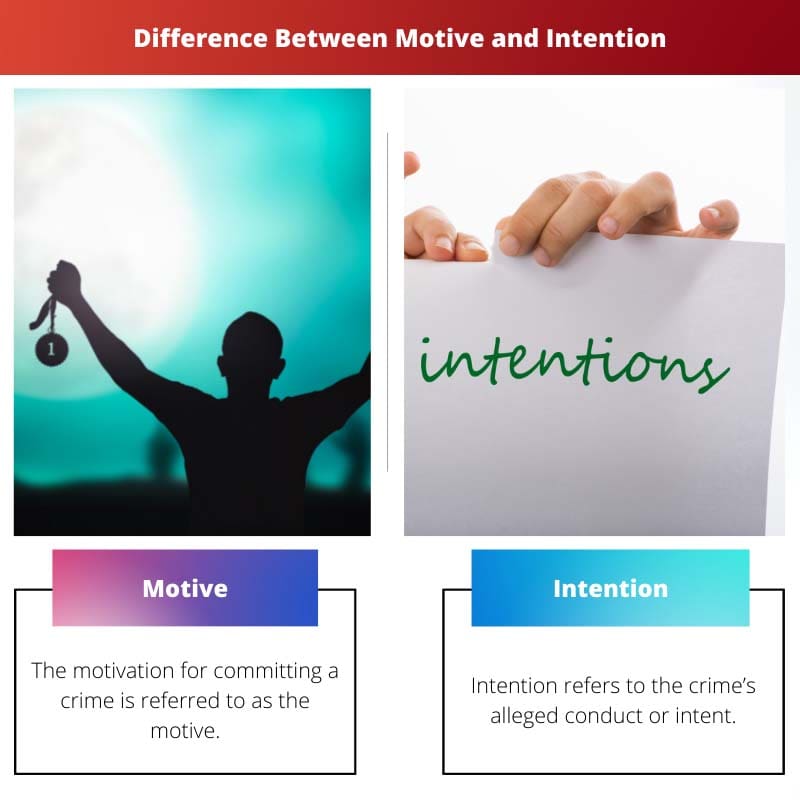The primary factor for making a person accountable for a crime is intention, which is linked with motive. Although we sometimes use the terms interchangeably, they are not the same in legal terms.
As motive refers to the motivation for doing so, intention refers to the reason for doing something.
Key Takeaways
- A motive is an underlying reason for doing something, while an intention is a plan or purpose to act.
- Motive is focused on the why, while the intention is focused on the what.
- A motive can be subconscious, while an intention is always a conscious decision.
Motive vs Intention
In legal terms, motive is a drive that directs a person to action towards reaching a desired goal. It refers to the motivation to commit a crime. The intention is a plan that will help achieve an aim or a purpose. It is the conscious effort carried out to break the law.

The motivation for committing a crime is referred to as the motive. It is frequently the suspect’s history in executing the claimed crime. In the backdrop, motive takes precedence over intent.
Motive, unlike intent, may be determined, but its presence does not necessarily imply guilt. Proof or an excuse on the part of a suspect can be used to disprove it. Motive is a starting point but is not a definitive component in linking a person to a crime.
Intention, on the other hand, refers to the crime’s alleged conduct or intent. Because a damaging action was taken, it is the result of the motive and carries a higher level of guilt.
The term “intent” refers to a deliberate and conscious endeavor to break the law and commit a crime. In the sphere of law, intent is defined as the preparation and desire to carry out a specific action. It can be found in both criminal and civil law.
Comparison Table
| Parameters of Comparison | Motive | Intention |
| Definition | Cause for doing something | Purpose of doing something |
| Interpretation | The reason that pushes do the act. | Means or conditions which resulted in the offense |
| Connection to crime | It is concealed or inferred objective | Its crimes openly stated goal |
| Law aspect | It doesn’t determine an offender | A person’s intentions are the determining factor |
| Includes | Motive includes all persons of interest, including the suspect | It only includes suspects |
What is Motive?
Motive is the mental state that leads to the formation of an intention. In other words, the motive is conveyed as an unspoken desire. Motive is treated as a hint or the root cause of the intention.
A person’s motive can be inferred by looking at the numerous elements that contributed to the crime being committed.
Motives are indeed a state of mind that causes or accelerates the formation of an intention. An intention that isn’t conveyed. An enticement to ratchet up the intensity of the intention.
The rationale for the intention or the thought that went into it. In a criminal case, it is essentially absent.
It doesn’t matter if you’re trying to prove someone’s guilt, but it does matter if you’re trying to prove their intent.
When there is substantial evidence, the absence of purpose may be a positive outcome for the accused, but when there is direct evidence, the motive becomes irrelevant.
The purpose there in the case of “Criminal Conspiracy” renders the conduct wrongful, even though the deed was not itself morally wrong. When a specific aim is part of the concept of the crime, the motive becomes important.
The motive is important in cases of defamation and malicious prosecution.
What is Intention?
A determined or deliberate purpose to achieve the intended goal is referred to as intention. It indicates that the individual actively or intentionally arranges his actions to reach the desired outcome.
In simple terms, the intention is the reason for doing something.
There are several offenses under the Indian Penal Code (IPC) that require proof of intent before being sentenced. This Code has not defined the phrase, which can sometimes lead to inequity.
For example, in a trial under Section 299 of the IPC, 1860, if the purpose behind killing a person or causing such physical injury is proven, the conviction will fall under Section 304, Para 1, but if only understanding behind causing death or causing such bodily injury is proven, the conviction would then eventually fall under Section 304, Para 2 of the IPC, 1860.
The intention is even further broken down into two levels.
- The genuine aim of committing a serious crime, with no premeditated consequences of the act, is known as general intent.
- Specific Intention pertains to a person’s mental state in which the person performing the act has prepared for the repercussions of his or her actions before performing them.
Main Differences Between Motive and Intention
- The term motive is described as an implicit cause that prompts a person to do it or not to do something, whereas the term Intention is defined as a conscious cause and recognized effort to behave in a way that is prohibited by law.
- The intention of a person can be determined by the employment of specific means and the conditions that resulted in the criminal offense, whereas the motive is the reason that pushes a person to do something or refrain from doing something.
- The motive is a concealed or inferred objective, while the intention is the crime’s openly stated goal.
- The motive is not the key factor in determining culpability, thus, it does not need to be confirmed, whereas the intention of a person is the factor in determining criminal liability, and it must be put in place beyond possible suspicion.
- All persons of interest, including the suspect, are subject to motive. Intention, on the other hand, can be focused completely on the suspect.




